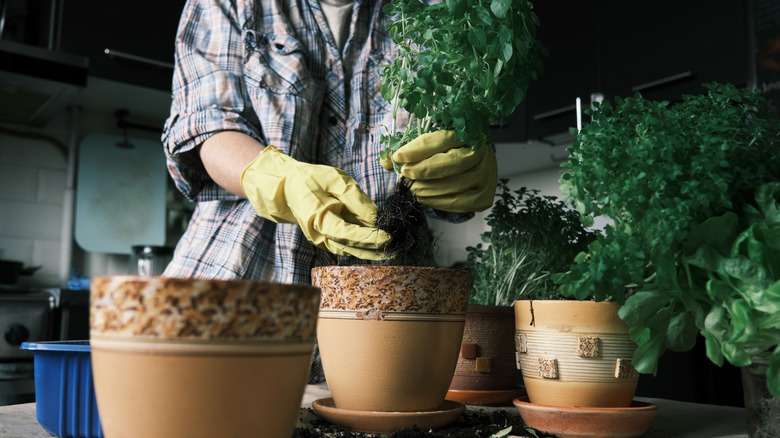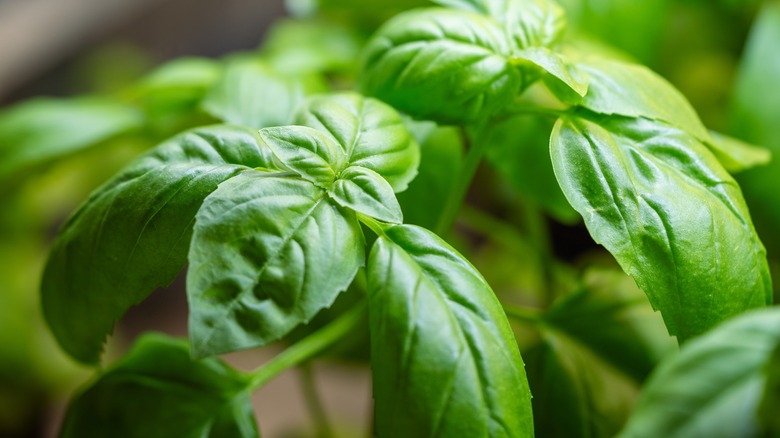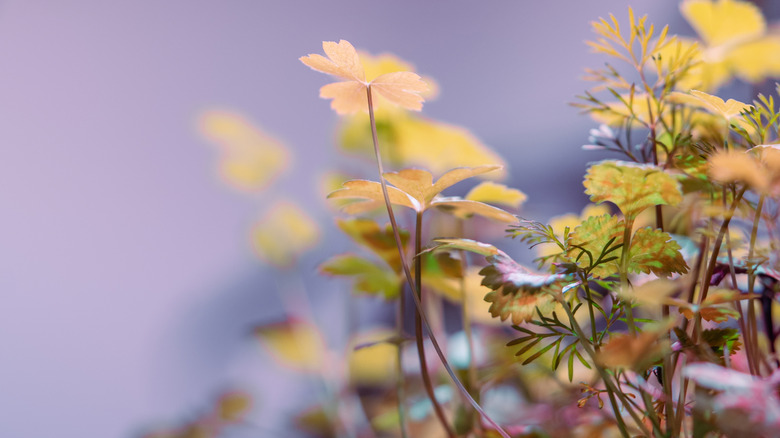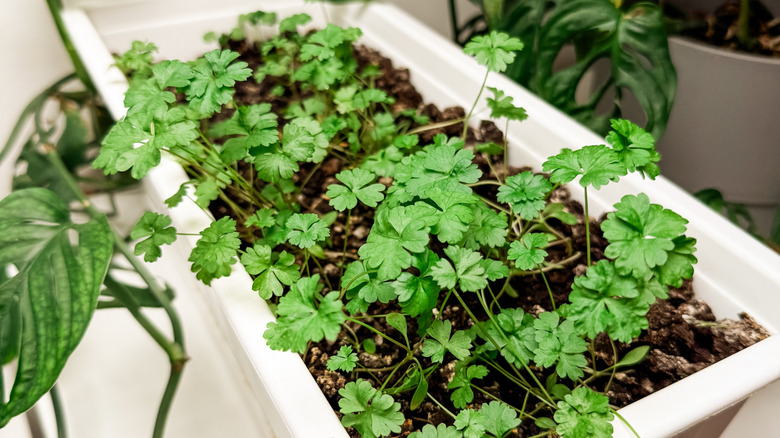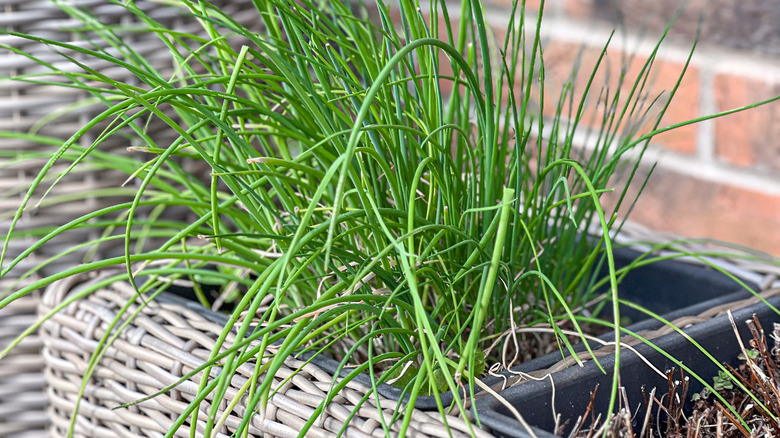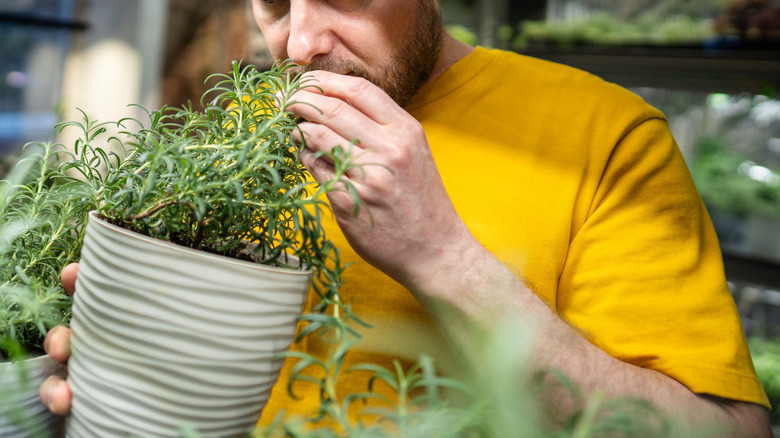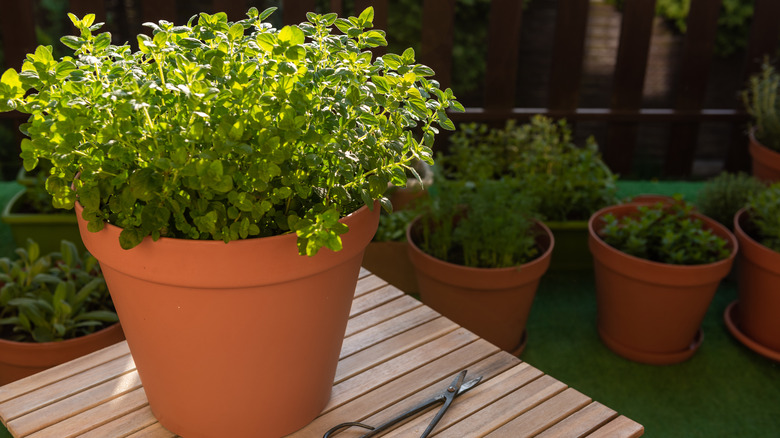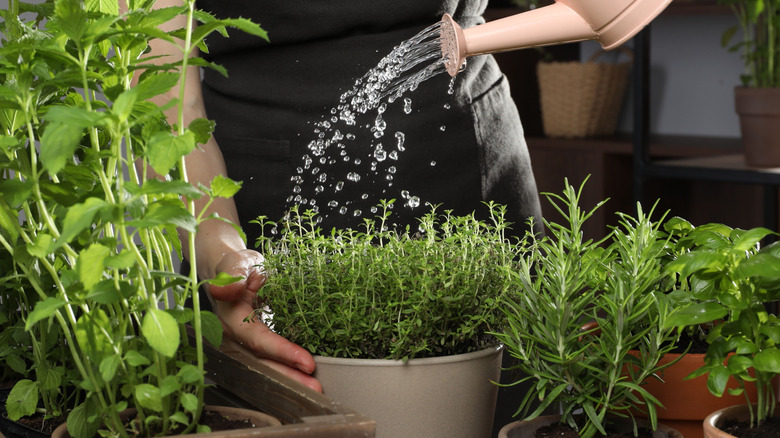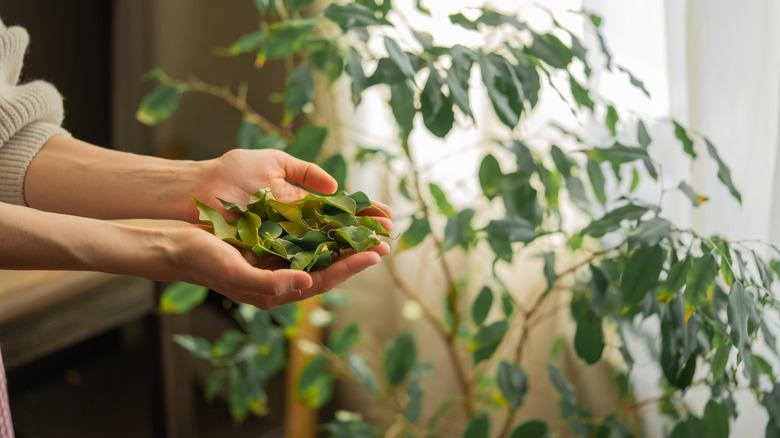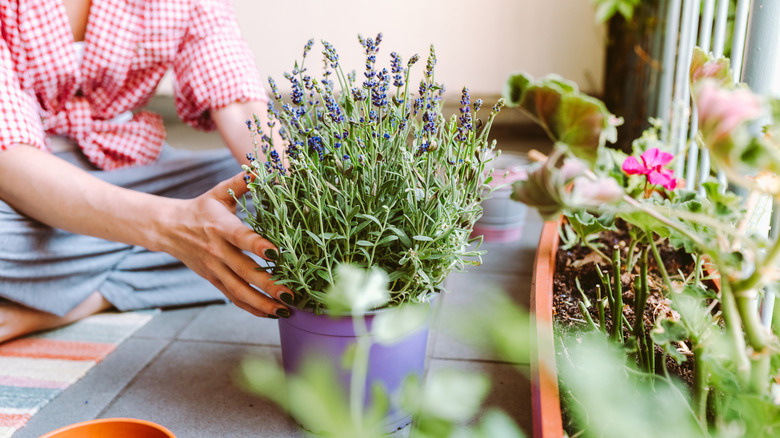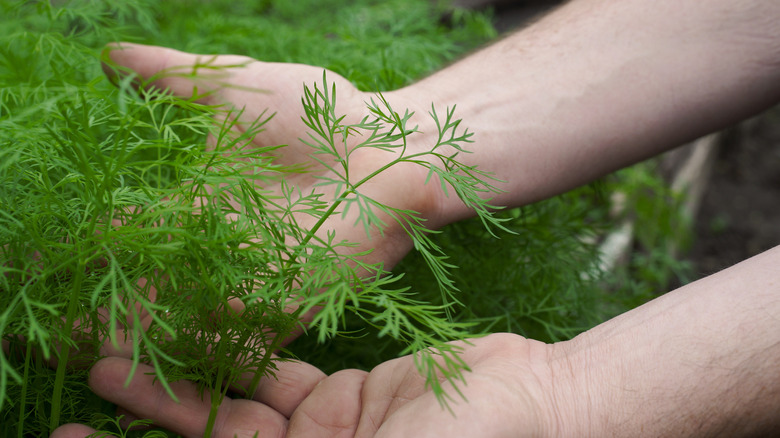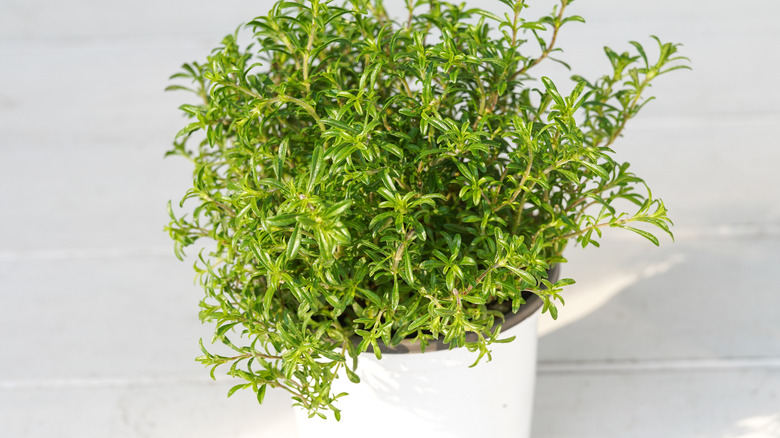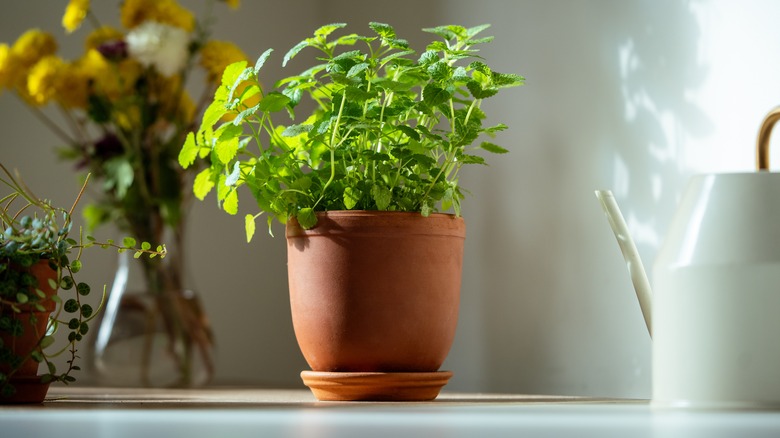14 Tasty Herbs That Thrive When Grown In Your Garage
With temperatures dropping and autumn arriving, many of the plants in your garden won't last much longer. Thankfully, you can keep growing delicious herbs throughout the winter season by moving your plants into your garage. Because many herbs grow well in containers and should be kept indoors during winter when the weather gets too cold, they are the perfect plants for starting a garage garden. Protecting your plants from strong winds and extreme temperatures outside by relocating them to shelves or a table in your garage will allow you to have fresh, delicious herbs all year long.
Depending on the plants you're working with and your local climate, you may need to use a heater to keep your garage at a good temperature for them to grow. Making sure your garage door is tightly sealed will help to insulate the space, or you could try hanging plastic sheets around your plants to keep that area warmer. Supplying your herbs with artificial light is likely necessary if your garage windows are small or there aren't many of them. Many herbs will still need five to eight hours of sunlight to grow in your garage, and ensuring your plants get enough light is crucial for them to thrive.
Keep using fresh basil throughout winter by growing it in your garage
Sweet basil (Ocimum basilicum) is a delicious herb that's used in a variety of dishes, and you can keep your plant alive for a bit longer by moving it into your garage. This delicate annual dies when temperatures drop below 50 degrees Fahrenheit, though keeping it in a warm or heated garage will allow you to continue harvesting fresh leaves for a while. Unfortunately, this herb will eventually die because it's an annual, but you could germinate new basil seeds in your garage as well, giving you a jump start for planting next spring.
To keep your basil happy and growing, it'll either need to be near a very sunny window or provided with 10-12 hours of artificial light every day. Additionally, basil loves most soil that drains well, so it's crucial to check that your soil isn't totally drying out between waterings. While a garage garden will let your basil live a little longer, growing it inside could cause the leaves to have a milder scent and flavor compared to basil grown outdoors.
Grow your cilantro in your garage to keep it alive after the first frost
While cilantro (Coriandrum sativum) can cope with a light frost and grows well during cooler autumn and spring temperatures, deeper freezes will kill your herb. Once the first frost has passed, the weather may start to get too cold for your cilantro, and relocating the plant to your garage is an easy way to prolong its life. Because hotter temperatures cause cilantro to bolt and start flowering, a garage with a mild temperature is a great place for this herb to thrive. Additionally, you may only want to move cilantro that's already growing in a pot, as it doesn't always tolerate being transferred.
For those in areas with extremely bitter winters, a heater may still be necessary to keep your cilantro happy. Since this herb does best in temperatures over 50 degrees Fahrenheit but bolts when it's hot, it's crucial to ensure your garage is not too cold and your cilantro isn't beside the heater. Leaving your grow lights on for 12 to 14 hours and making sure the soil stays moist (but not soggy) will allow your cilantro to thrive.
Parsley prefers cooler temperatures and makes a great addition to garage gardens
If you want to keep using the fresh parsley (Petroselinum crispum) that's been growing in your garden, transplanting the herb into a container during fall and putting it in your garage is a fantastic option. Parsley prefers to be in cooler areas, and your garage will help this herb thrive during winter. While this will let you continue harvesting parsley leaves throughout colder months, this biennial will grow a seedstalk if it's returned to your garden in the spring and you'll need to start a new plant next year.
When trying to grow parsley in the winter, you'll need to provide your herb with moist soil, a well-draining pot, and lots of light. Otherwise, the plant will become spindly. While parsley may continue to be harvested outside in winter in some areas, those in regions with very cold temperatures can help their plants by relocating their parsley to the garage during frigid months.
Chives can be transferred from your garden to your garage
To continue harvesting chives (Allium schoenoprasum) from the same plant over and over, you can divide and transfer your herb into a pot during fall before relocating it to your garage. Once spring rolls around again, return this perennial to your garden for an endless cycle of fresh, tasty chives. Since chives are a cool-season herb that is somewhat tolerant of cold weather, your garage is the perfect spot to keep this plant going during freezing winters and harsh frosts.
While it may not need a heater, your chive plant will require moist soil and a lot of light to keep producing fresh herbs for your kitchen. Chives are a relatively easy plant to grow in indoor areas like garages, but without enough light your plant won't do much active growing. This can be a struggle for chives during dark winter months, and sometimes the herb will even die back. With supplemental lighting, such as LED lights, in your garage, your chives will continue producing delicious leaves all winter.
Move your sage to your garage for fresh herbs all year
Very cold winters can sometimes mean the death of your sage (Salvia officinalis) plant, but moving your herb into your garage for the colder months will allow you to grow fresh sage all year. You might also take cuttings from your sage plant at the end of summer, transfer them to a pot, and grow those in your garage during winter. For those who experience extremely bitter temperatures in winter, you might consider a heater for your sage to grow its best.
In order for your sage to succeed in your garage, it'll need the equivalent of full sunlight. While this herb will sometimes struggle with pest issues when brought inside, allowing the soil to fully dry out is preferable for sage and well-draining soil can combat insect problems. Once the weather warms up again in the spring, you can bring your potted sage outside or replant it in your garden.
Rosemary will stay healthy year after year when grown in your garage
While rosemary (Salvia rosmarinus) bushes can survive in your garden in some locations, these perennial herbs need to be moved to your garage if you have winters where temperatures drop below about 10 degrees Fahrenheit. Relocating your plant before the first frost of the season is a fantastic way to keep your rosemary thriving all year long. Because this herb is accustomed to cooler temperatures, there's a possibility you won't have to heat your garage depending on where you live. When spring arrives, you can move your potted rosemary outside again or transplant it into your garden.
If you're moving rosemary from your garden into your garage, you'll want to transfer it into a pot about three weeks before cold weather will set in. Allow your rosemary to sit outside in its new pot to get acclimated before further relocating it to your garage. This herb may require more light than some others and will grow well if you let the soil dry a little before watering, though spider mites and other pests can sometimes be a problem for indoor rosemary.
Growing mint in your garage prevents it from overtaking your garden
One way to keep your mint plants happy and healthy during winter is to move their containers into your garage after the first light frost. Since most varieties of mint (Mentha) are aggressive perennial plants, growing them in your garage will also prevent them from spreading throughout your whole garden. While most varieties of mint will survive in outdoor temperatures as low as -20 degrees Fahrenheit, allowing your mint to experience a little frost and then moving it to a warmer area will help your plant form new growth.
The short period of cold signals to the plant its time to rest, and then the warmer temperatures of your garage encourage it to begin growing new leaves again. To have success with your mint, you'll want to ensure the soil stays moist. Indirect sunlight may be enough for this herb, but mint typically prefers full sun for it to grow its best.
Oregano is a hardy perennial that'll thrive in your garage
Oregano (Origanum vulgare) can be a hardy perennial in some zones, but in colder areas bringing this herb into your garage for winter is the best choice to help it survive and thrive. Because oregano grows well in containers and could use a little protection from harsh winter weather, as it loses its leaves during frosts, this delicious plant would make a wonderful addition to your garage garden. In the right conditions, oregano (especially Greek oregano) can act as an evergreen and produce herbs all year long.
For your oregano to survive winter and grow well in your garage, it will need an abundance of sunlight and well-draining soil, though it will still flourish in soil that isn't very rich. It's best to let your plant dry out a bit before watering again. By growing oregano in containers in your garage garden, you can have yummy herbs throughout the year and keep harvesting from the same plant year after year.
Thyme will be a big success in your garage with lots of light
While thyme (Thymus vulgaris) can be a frost-tolerant plant, colder weather will also sometimes lead to this herb dropping some of its leaves. Replanting your thyme in pots during autumn and bringing them into your garage will help them grow well throughout winter, allowing you to keep using these fresh herbs in your kitchen during frigid weather. Because thyme is an evergreen perennial, it'll continue producing leaves all year every year, as long as you ensure to keep your thyme healthy through the winter.
Thyme can be very successful in a garage garden, but it'll need lots of light to truly thrive. Thyme will sometimes tolerate indirect light, but giving it the equivalent of full sunshine in your garage is best. This herb prefers somewhat alkaline soil that's sandy and dries out a bit before its next watering. If your thyme's soil has issues draining, it'll struggle to last through the winter.
Bay leaves will thrive in winter when grown in your garage
In USDA hardiness zones 8 and higher, bay laurel (Laurus nobilis) performs as an evergreen and can stay in your garden all year; however, it's extremely susceptible to frost damage and needs to be protected from winter weather in colder locations. Starting your bay laurel plants in containers is a great idea, as they grow slowly and you can easily move them to the garage when temperatures start to drop. It's crucial to relocate these herbs before the first frost occurs. If your garage experiences freezing temperatures in winter, consider using a heater to grow your bay leaves.
Though bay laurel will be protected from the cold in a garage garden, you'll need to make sure it's getting a lot of light to succeed. If your garage windows aren't very bright and your herb can't get six full hours of sunlight each day, you'll need to provide it with about 12 to 16 hours of artificial light. In the spring, you can bring your potted bay outside again to continue growing through the next year.
Lavender flowers can last for years when moved to your garage in winter
Depending on where you live, moving your plants to your garage for the winter will help you easily grow lavender for an endless supply of dazzling purple flowers. Lavender (Lavandula angustifolia) functions as an annual in areas below USDA zone 5, as it can die during a very cold winter, but lavender is actually a perennial. Relocating your lavender plants to your garage will allow them to stick around for next year, and you can enjoy its fresh flowers throughout the bitter months. Additionally, moving your herbs can prevent them from getting too wet during heavy rains and snow. Since too much moisture may prove fatal to these plants in winter, keeping them in your garage will let you control the amount of water your plant receives.
Lavender is a beautiful addition to your garage garden and will grow well there throughout winter as long as it's getting enough light. For those without bright garage windows, giving your herbs 14 to 16 hours of supplemental light is vital. When lavender is always kept in containers, it'll need to be replanted in a bigger pot during spring each year.
Dill grows well in garages but may need to be staked
Dill (Anethum graveolens) is a super common herb to find in indoor gardens, and it'll grow wonderfully in your garage as well. To keep using fresh dill in your cooking after summer has passed, simply move it into your garage and place it in an area with lots of natural or artificial light. For dill to be successful as a potted plant in your garage garden, you'll need to use a rather deep container because of its taproot.
This herb should be getting at least six hours of direct sunlight from a bright window, but if that's unattainable try shining your grow lights for approximately 12 hours. When your dill plant is not receiving enough light, it can become spindly. If you find that your dill is getting spindly because your garage isn't quite bright enough, you'll have to stake it. By providing your herbs with soil with good drainage and plenty of light, your dill will continue giving you fresh, delicious leaves.
Relocate winter savory to your garage when the weather gets cold
Winter savory (Satureja montana) is a delicious herb that has also been used medicinally, and since it grows beautifully inside it could also make a great addition to your garage garden. While winter savory can be pretty hardy in USDA zones as low as 5 or 4, you might consider relocating it to your garage to prevent it from going dormant as quickly in winter. Simply bring your potted shrub inside when the weather starts getting colder to enjoy its yummy leaves a little longer.
This herb is also sensitive to very damp soil and may have issues with rotting during the colder months if the soil isn't draining properly. Keeping your winter savory in your garage during winter is a great way to control the moisture and keep your herbs healthy. To ensure your winter savory is successful in your garage, it'll need well-draining, alkaline soil and a lot of light. The stems of your winter savory plant may start turning woody as the herb ages, but you can prune them to promote the growth of soft, new stems.
Lemon balm can grow in a garage but might have a weaker flavor
For those that live below zone 5, your lemon balm (Melissa officinalis) may not be hardy enough to make it through the winter. In cold, wet winters, this citrusy perennial can struggle with becoming overly damp, but your garage will help protect them from rain and snow. Lemon balm is not difficult to grow indoors or in your garage, though it's susceptible to spider mites when inside and may require more light than some other herbs.
Though lemon balm often needs a fair amount of light, it will grow well with indirect light. Using soil that doesn't hold onto much moisture will also promote the health of this herb and prevent it from becoming too wet. Unfortunately, lemon balm that's grown in your garage may not have as strong of a flavor as the herbs harvested from your garden. Keep in mind that lemon balm spreads by releasing seeds, but growing your plant in a container in your garage will keep those seeds from sprouting all over your garden.
